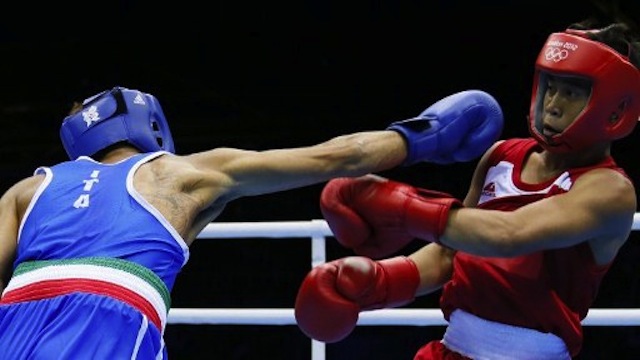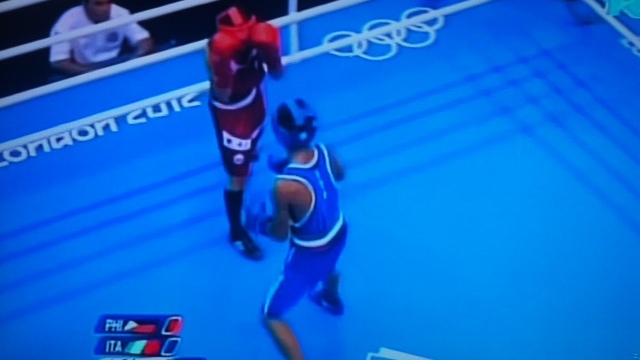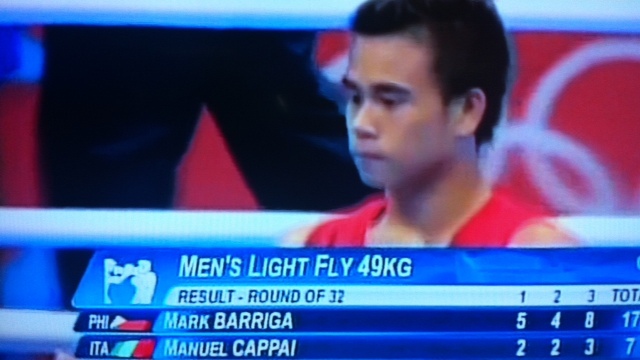SUMMARY
This is AI generated summarization, which may have errors. For context, always refer to the full article.

MANILA, Philippines – The Philippine delegation for the 2012 London Olympics, the smallest the country has seen since 1936, has its biggest bet for an Olympic medal on the smallest athlete of its delegation: young boxer Mark Barriga.
After his dominant first round win over Italy’s Manuel Cappai, excitement has mounted in the boxing-crazed nation that has produced world boxing champions Manny Pacquiao and Nonito Donaire.
The 19-year-old is scheduled to face Kazakhstan’s Birzhan Zhakypov, on Saturday, 8:45 pm Manila time.
Rappler brings you all you need to know about Mark Barriga and his chances for an Olympic gold.
Davao’s pride
A Filipino through and through, Barriga was born and raised in Panabo, Davao del Norte and trains with the Davao del Norte Boxing Team.
He started boxing at the age of 10, after his father, a printing machine operator, encouraged his son to learn the sport so he could protect himself from bullies.
Barriga, who stands at 5 feet 2 inches, has always been smaller than his peers both inside and outside the ring.
In the light flyweight category, the lightest weight division in the Olympics, Barriga is one of the smallest entries. The weight limit for the division is 48 kg, or about 106 pounds.
Barriga told the Wall Street Journal that in the beginning, he did not enjoy boxing and was always getting beaten up. But after several months, the tiny fighter was able to exchange punches with his bigger opponents, which triggered his interest in pursuing a boxing career.
Road to the Olympics
From smaller competitions, Barriga eventually went on to compete internationally. Like Pacquiao, Barriga is a southpaw, or a left-handed fighter.
His first huge win was in 2010, when the then 16-year-old won the Filipino Youth National Championships in his weight division.
He went on to win the annual Sydney Jackson Memorial Tournament in Uzbekistan in 2011 and 2012.
Barriga qualified for the Olympics, surprisingly, through a loss, at the World Championships in Azerbaijan last October.
After defeating Irish boxer Patrick Barnes, the bronze medalist in the the 2008 Beijing Olympics, he made it to the quarterfinals where he lost to China’s Zou Shiming, who ended up winning the tournament.
Through a rather unusual qualification rule in the tournament, Barriga won a slot in London not for winning the tournament, but for losing to the eventual winner.
Assets and strategy
Before the Games, Barriga briefly trained with Pacquiao, who has offered the younger boxer a “bonus” if he comes home with an Olympic medal. Barriga also made a pitstop in Cardiff, Wales, where he trained for three weeks before coming to London.
On Barriga’s corner is a dazzling Filipino asset – his trainer, Roel Velasco. Velasco won a bronze medal for the Philippines in the 1992 Summer Olympics in Barcelona, Spain in the same weight division that Barriga is currently fighting in.
The former Olympian also coached his younger brother, Mansueto “Onyok” Velasco, who won the silver medal at the 1996 Atlanta Olympics in the same weight division.
After his loss to Shiming, Barriga has been working on his stamina and technique with trainer Velasco, focusing on footwork, defense and quick counter-punching.
“I know body shots don’t often count so I’m concentrating on head shots,” he told WSJ before the Games. “When the body’s open, I’ll stick in some shots just to open up the head. I’ve got to be quick on my feet because if you stand still, you’ll get hit.”
Barriga has turned down media interviews since the start of the Games to focus on his fights. He has also declined invites to dinners and events, only spending time with his supportive parents who are in London to watch their son.
“There’s big pressure because I’ll be the only Filipino boxer in London, but I just ignore it,” he said.
How likely is a win?
Of the nine medals won by the Philippines in the history of the Olympics, five come from boxing. Of the nine, seven are bronze, and two are silver — both from boxing.
After Onyok Velasco’s impressive 1996 win, the last medal the country has won in the Games, Filipino boxers have failed to come close to victory.
In the 2000 Sydney Olympics, two of four fighters, Danilo Lerio (light flyweight) and Arlan Lerio (flyweight), made it up to the second round where they were both stopped, ending their Olympic stint.
A similar fate befell Filipino boxers in 2004 in Athens, when two of the the four who qualified, Harry Tañamor (light flyweight) and Romeo Brin (light welterweight) only made it up to the second round. Tañamor tried again in 2008 at Beijing, but that time, lost in the first round.
Barriga however, appears to have a greater chance at making it past the second round and moving on to the final 8.
His opponent, Zhakypov, barely won his first fight, scoring an 18-17 victory over France’s Jeremy Beccu. Barriga on his part, convincingly beat Cappai 17-7. Other boxing experts, like Cuban coach Raul Liranza, are picking Barriga over Zhakypov.
After Zhakypov, Barriga could face either Cuba’s Yosbany Veitia Soto or Shiming who overwhlemingly defeated him in Azerbaijan 12-5, in the quarterfinals.
A win there will give the Philippines an automatic medal, at least a bronze. The winners of the two semi-finals will face off in the gold medal match. The losers of the semi-finals are each awarded a bronze.
Soto is one of the top favorites in the light flyweight class, while Shiming, aside from ending Barriga’s quest for gold in the 2011 World Championships, won the bronze in 2004 and the gold in 2008.
But a determined and fearless Barriga prefers to meet Shiming, who he said he has been working on beating.
“He’s very experienced but he’s also getting old. I’ve studied his style closely,” he said in his WSJ interview. “I’m ready for him.”
As the country is too, to support its lone boxer. – Rappler.com
Add a comment
How does this make you feel?


There are no comments yet. Add your comment to start the conversation.